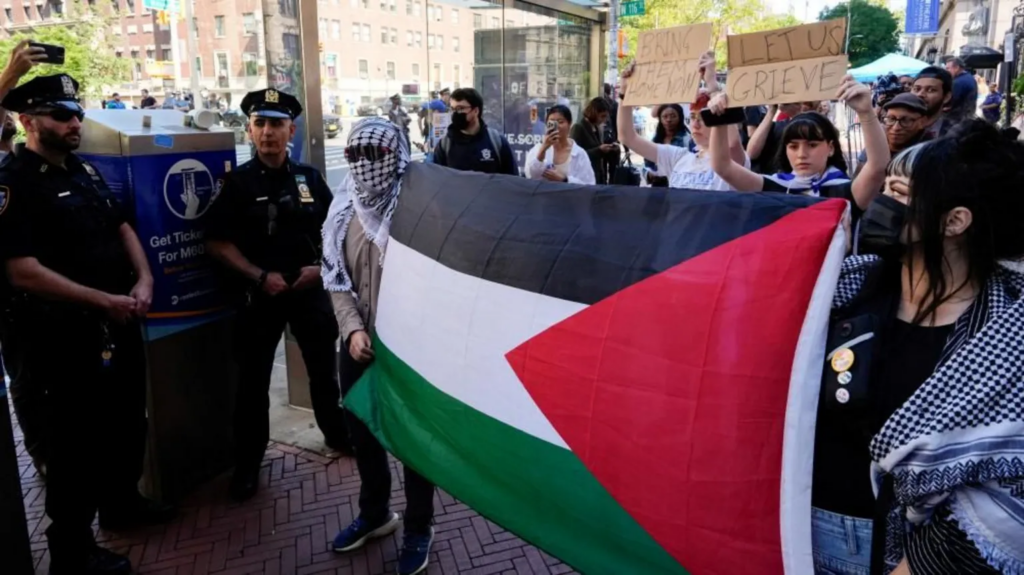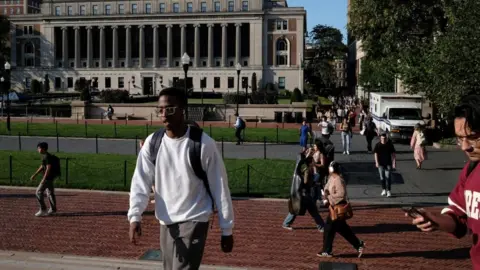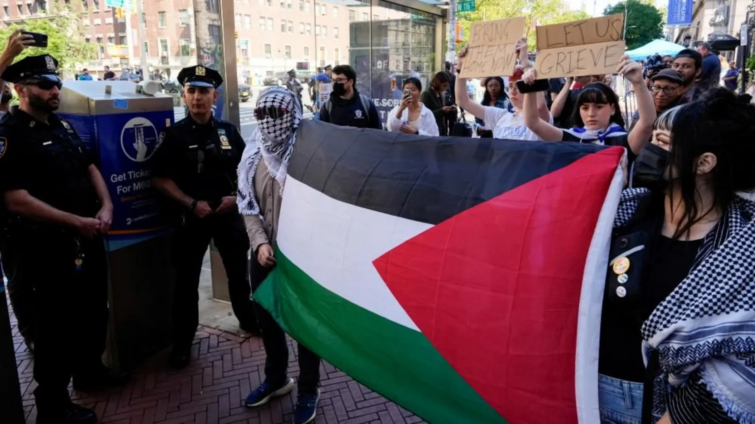Columbia University students began the school year with fresh protests and increased security just outside their famous New York City campus.
Last term, the Ivy League college saw some of the largest and tensest campus demonstrations in the US as students protested against Israel's military operation in Gaza.
On Tuesday, the first day of term, all eyes were on the demonstrators who gathered at the school gates to see whether they would reflect the scale of the earlier protests.
Police said there were at least two arrests on Tuesday, but characterised the gatherings as "peaceful".
Pro-Palestinian protesters - many of their faces covered in traditional keffiyeh scarves - could be heard several blocks from the site of the demonstration on Tuesday morning. They chanted "Free Palestine" as they banged on drums and marched in circles outside Columbia University's famous iron gates.
On the other side of metal barricades, students and staff watched the demonstration as they queued up to have their identification thoroughly checked before they could enter campus.
Inside, the biggest disruption occurred around noon on Tuesday, according to CBS News, the BBC's US partner. The Alma Mater statue outside Low Memorial Library was doused with red paint - allegedly by protesters. The area was reportedly blocked off, as a crew worked to clean the statue.
Columbia’s previous academic year concluded with the New York Police Department raiding a pro-Palestinian encampment that had taken over the campus quad. Student protesters then briefly occupied an academic building that police ultimately cleared, leading to more than 100 arrests.
The school cancelled its main graduation and the student body left for the summer under a cloud of deep unease.
Last month Minouche Shafik - who served as Columbia's president during the encampment and permitted the police raid - resigned.
On Tuesday, the pro-Palestinian protesters asked the returning students to remember why they had demonstrated during the last academic year.

“We ask that you put aside your excitement for a new school year and remember the Palestinians who died by our very dollars,” read a flier that the protesters distributed.
Multiple protesters declined the BBC’s interview requests on Tuesday, and participants were generally unwilling to speak to the press.
By mid-afternoon, the pro-Palestinian demonstration concluded - though protesters chanted: "We'll be back."
Most students on Tuesday appeared unfazed by the demonstrators. Several excitedly greeted each other, hugging after a summer apart. Two students manoeuvred a flatscreen television through protesters and metal security barriers.
Stephanie Lee, a 28-year-old graduate student studying business, said she expected there to be protests, but she felt "OK" on her first day on campus.
“Security is pretty good," she added.
Rachel Black, a freshman from North Carolina, said that she saw the protests as a welcome part of her overall experience at Columbia University.
“I’m interested in becoming more educated,” she said. “I’m hoping to learn what the conflict [is] about.”

Columbia University spokesperson Samantha Slater did not acknowledge the protests in a statement provided to BBC News.
"As we begin the new semester, we are focused on our mission of teaching, creating, and advancing knowledge and ensuring a safe, respectful campus environment for our community."
Multiple protests and counter-protests have been staged at Columbia University since Hamas’s attack in Israel on 7 October, 2023. The attack left about 1,200 people dead, while 251 people were taken hostage.
About 40,000 people have been killed in Gaza, according to the territory's Hamas-run health ministry, since Israel began a retaliatory military campaign that has drawn international criticism.
On Sunday, Israel announced it had recovered the bodies of six of the hostages who were taken to Gaza. Among them was 23-year-old Israeli-American Hersh Goldberg-Polin, whose parents waged a public campaign calling for his release.
David Lederer, a 22-year-old junior at Columbia University, held a small-counter protest along with a fellow Jewish student outside the university gates on Tuesday.
His friend held a photo of Goldberg-Polin, and the two unfurled a large banner that read “Get Support for Terrorism Off Our Campus”.
Mr Lederer - who was sworn at by one passerby - is one of several pro-Israel Jewish students who have expressed concern about antisemitism on campus. They said the pro-Palestinian groups had not sufficiently condemned the 7 October attack or its perpetrators.
“To be anti-war is one thing, but to be pro a terrorist organisation is another, and that has no place at Columbia,” Mr Lederer said.
Latest Stories
-
Royal Sweet Limited signs up for JoySports Invitational Tournament 2025
23 minutes -
Ghanaian movie industry wasting talent – Gloria Sarfo
24 minutes -
Ho West MP secures 100 international scholarships for constituents
59 minutes -
Bank of America’s Bernard Mensah discusses AI, jobs and global economic pressures
1 hour -
President Mahama announces plans to build six modern sports stadia
1 hour -
Expert wants gov’t to extend NSS allowance beyond service period
1 hour -
Western North: Mahama pledges action over ‘empty slogans’
1 hour -
Ghanaian AI startup Fornix Labs pilots tool to support workload of doctors
1 hour -
CCTV captures woman allegedly stealing baby at Ajumako market
1 hour -
WAFU B Boys Cup: Black Satellites take on Benin U-20 in second group game
2 hours -
Togbe Afede lauded for exemplary leadership during Asogli Yam Festival
2 hours -
Gov’t to cancel Teacher Licensure Exam on August 30
2 hours -
Ennobled Foundation webinar empowers Ghanaian youth to leverage international experience for career growth
2 hours -
JoySports Invitational Tournament: Ayuda signs on for 2025 edition
3 hours -
Seth Terkper loses wife; family requests privacy
3 hours

